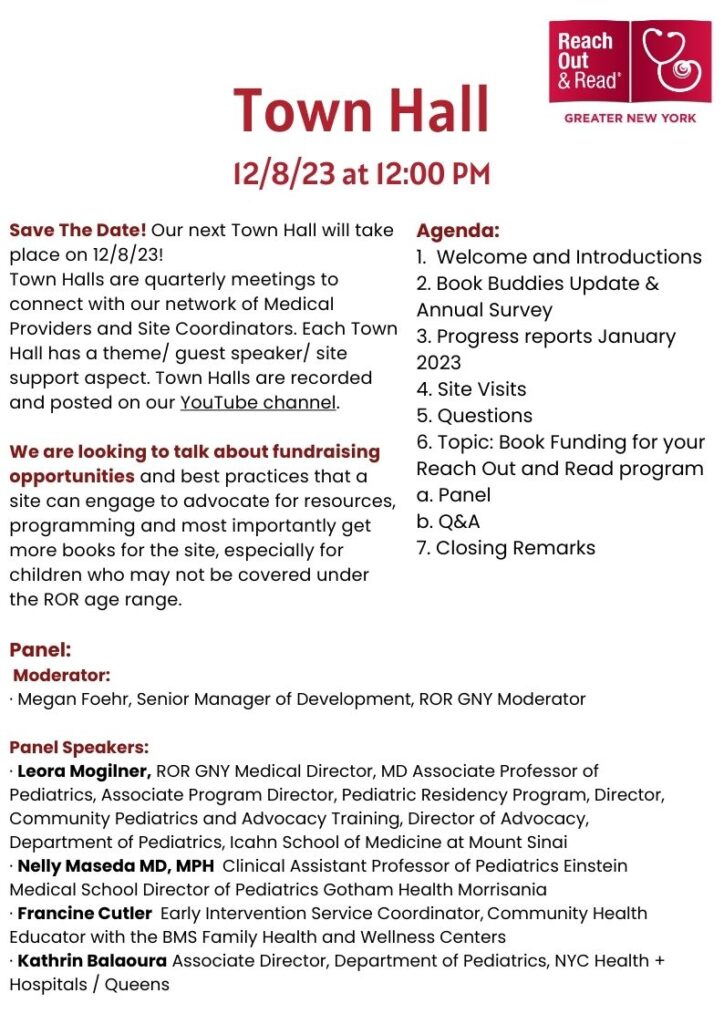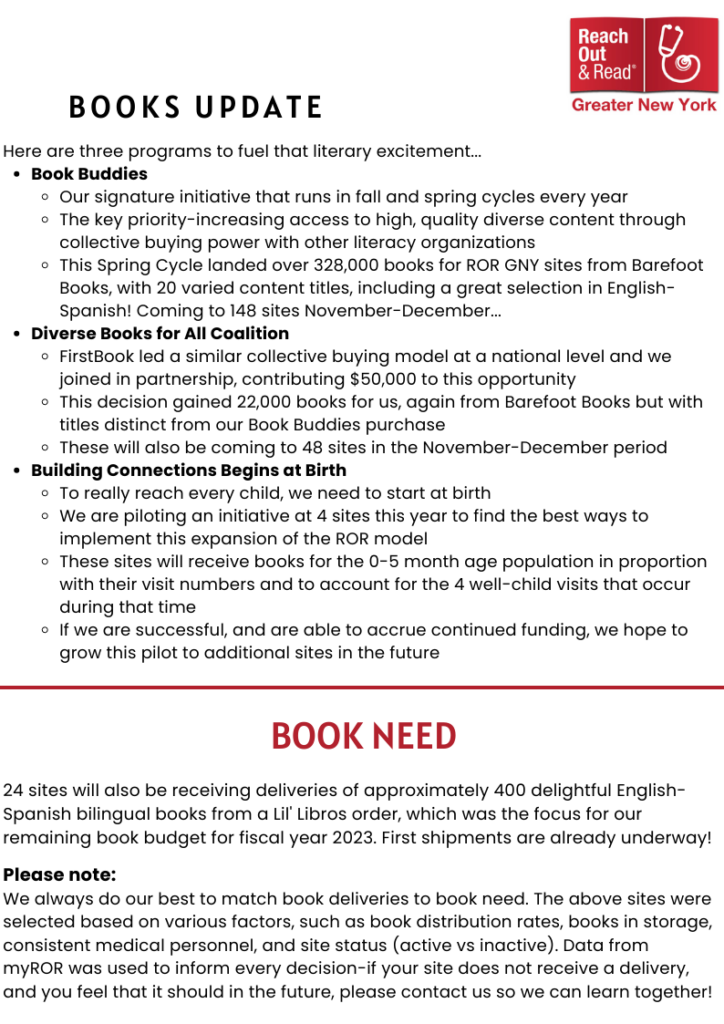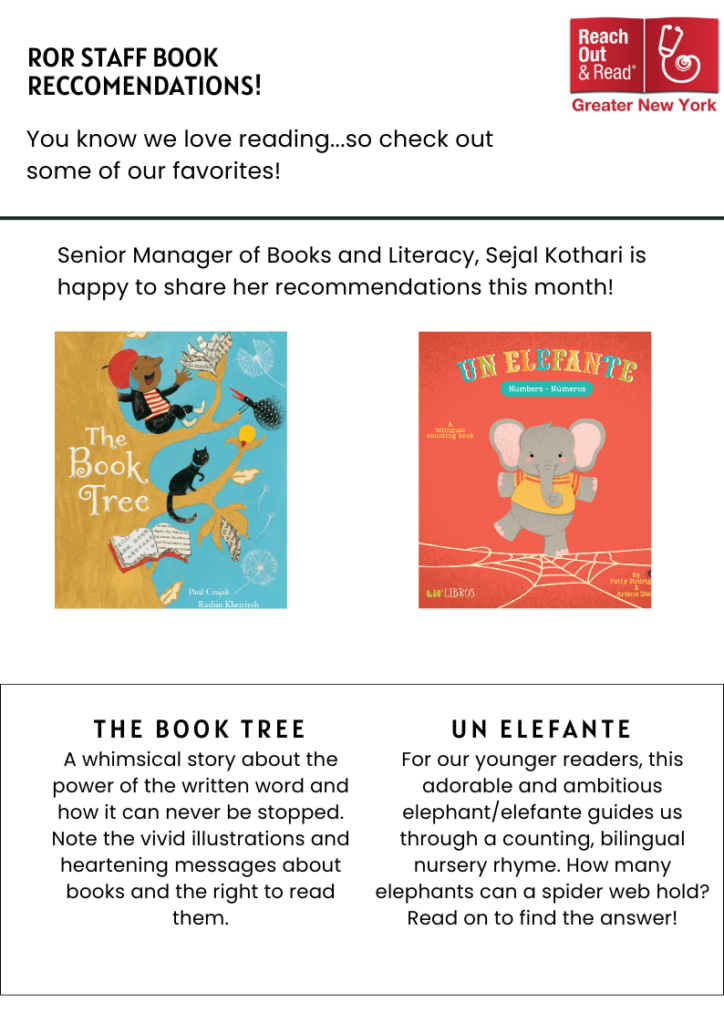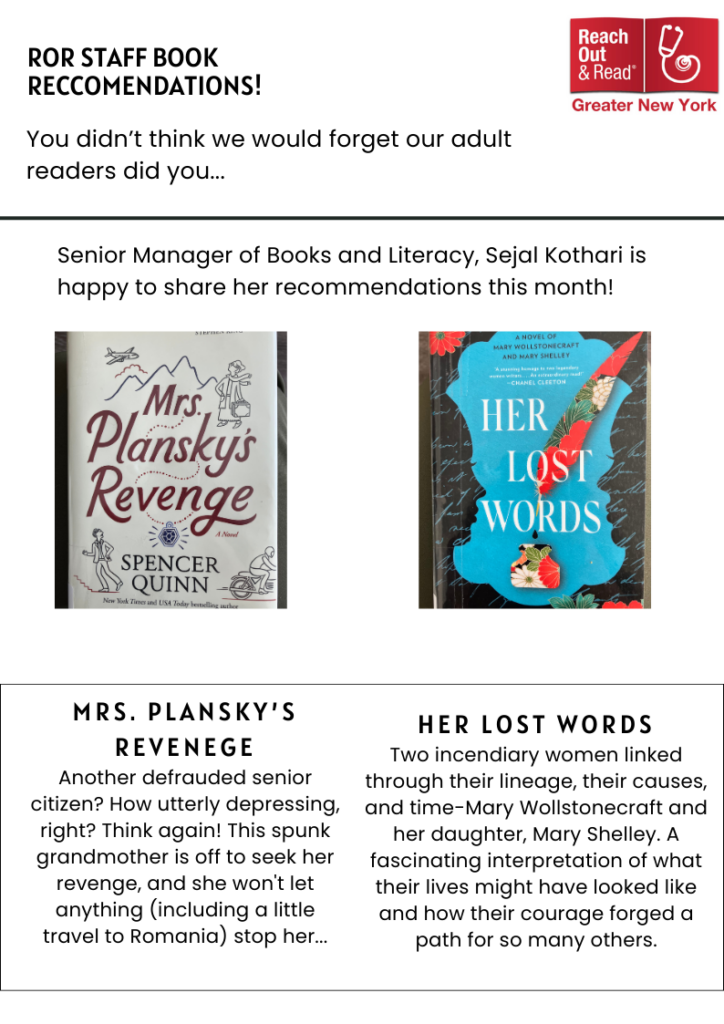Executive Director Emily Marchese was interviewed on Spectrum 1 New York In Focus to speak about the new 35 for 35 partnership with Scholastic and promoting diverse books throughout New York City.
Research shows that reading to your child can improve their literacy and brain development; it can also help them drift off.
We know that bedtime reading can be an enjoyable, cozy experience. That’s why many of us have made it a staple of our bedtime routine. But what you might not realize is that it’s not just a nice way to bond and create memories. Reading to your kids has many tangible benefits. It promotes literacy, healthy child development, encourages lifelong reading and literacy habits, and, yes, even helps kids sleep better. We caught up with some experts in the fields to help us understand the many benefits of bedtime reading, along with tips for making bedtime reading a habit.
Benefits of reading a bedtime story to your kids
“Establishing a bedtime routine that includes reading books and telling stories is a wonderful way to promote parent-child bonding while helping develop children’s literacy, language, and social-emotional skills,” says Dr. Leora Mogilner, associate professor of pediatrics at Icahn School of Medicine at Mount Sinai, NY, and director of Reach Out and Read. An added bonus? Bedtime reading helps kids sleep better.
Let’s take a look at a few of the main benefits of reading to our kids before bed:
Better Sleep
If there’s one thing parents want more than anything, it’s to have kids who fall asleep easily — and stay asleep. For many kids, being read to before bed can do just this. “There is research showing that in preschoolers, a bedtime story may help them to sleep longer and better,” says Jade Wu, a behavioral sleep medicine psychologist and Sleep.com advisor. Additionally, as she points out, there’s evidence that kids with a bedtime routine involving reading are less likely to resist bedtime. So, reading to your child before bed may help with those challenging bedtime “battles.”
As Dr. Leah Alexander, pediatrician and consultant for Mom Loves Best, explains, reading at bedtime is a great way for children and teens to “wind down” before sleep and give their brains a rest after a day of learning and socializing. One advantage of reading a physical book rather than relying on a screen for nighttime wind-downs is that books don’t emit blue light, which can suppress melatonin, Alexander points out. Kids need adequate amounts of melatonin to feel sleepy and regulate their sleep-wake cycle.
Bonding
Life can be hectic, and although we all want to make sure we bond with our children on a daily basis, it doesn’t always happen. Daily reading time with your child requires you to slow down, be physically close with your child, and be fully present and available. “The cuddling and snuggling that take place with bedtime reading promote parent-child bonding and lets children know that they are loved and cared for,” says Mogilner.
Wu says, “Reading with your child at bedtime can be a powerful part of a bedtime routine that improves bonding.” Moreover, the bonding that reading promotes before bed applies to the many different types of family units out there, according to Wu.
“There is research to show that foster children, for example, can settle into a new home placement better if their foster parents take the time to bond and make them feel safe or comfortable during the bedtime routine,” Wu shares. The research, which looked at 485 foster caregivers in the U.S., found that having a bedtime routine that was calming, consistent, and — most importantly — infused with comfort and love was the most impactful way to get foster kids to sleep. And one of the best ways to offer love and connection to foster kids, according to Wu? The simple act of reading them a nightly bedtime story.
Literacy
There’s a ton of evidence that nighttime reading promotes early literacy. For instance, research from the 2017 Pediatric Academic Societies Meeting found that reading to kids when they are babies impacts a child’s reading and vocabulary skills a whole four years later when they are ready to start school.
Sydney Bassard, a speech-language therapist specializing in literacy, says that reading to children helps develop their vocabularies and hone their print knowledge skills, which include letter name and letter sound recognition. “Print knowledge and oral language skills are foundational for when kids go to develop reading skills later on,” Bassard explains. How best to ensure these skills are developed? “In reading a bedtime story, you can point out the pictures, showcase the differences between words and pictures, discuss the story, and teach them about how reading works,” Bassard explains.
Child development
The bond that happens during nighttime reading helps nurture a child’s social-emotional growth and development. “Reading stories and sharing books together are effective ways to enhance the positive interactions between parents and children, which form the cornerstone of the safe, stable, nurturing relationships (SSNR’s) that are so crucial for the development of a child’s social-emotional health,” Mogilner describes.
There is also abundant evidence that bedtime reading improves aspects of cognitive development. For example, a 2015 study published in Pediatrics found that reading during the preschool years was associated with activating areas in the brain responsible for mental imagery and narrative compression — both are important for language and cognitive development.
Benefits of independent bedtime reading
What about when kids get older and can read on their own or no longer want mommy and daddy to read to them? Experts say that independent reading is something to encourage in your older kids. Just like reading to little ones, independent reading time has numerous benefits.
“Reading at bedtime is as vital for older children and adolescents as it is for younger children,” says Alexander. It enables them to further develop their language skills and increase their knowledge base. Not only that, but it can provide a much-needed respite from social media, school requirements, packed schedules, and other life stressors, she says. There’s also evidence that bedtime reading protects against mental health challenges such as anxiety, she adds.
Independent bedtime reading doesn’t just promote enduring literacy skills, but it can also help foster good sleeping habits. “In general, having quiet independent reading time is a great bedtime routine to take into adolescence and adulthood because this can be a lifelong cue for the body and brain to transition from a busy day to relaxation and sleepiness,” Wu says.
How to implement a bedtime book routine
All the experts we spoke to have the same message about establishing a bedtime reading routine: Start early!
“I started reading bedtime stories to my kids as newborns even though they clearly didn’t understand anything yet,” Wu shares. Babies and kids are more open to reading than parents might think, especially if you make it fun. Wu recommends letting your little ones pick out books they’re curious about at the library and choose the ones they want to read at bedtime. “Make it interactive, do funny voices, and ask them what they think about the story,” she suggests.
As for when to transition to independent reading in older kids, it really depends on the child, says Mogilner. One way to transition a child is to participate in shared reading with a parent, taking turns reading pages and discussing stories as you read. Another suggestion from Mogilner is to set aside a certain amount of time for shared reading and then encourage the child to read on their own after the parent says goodnight.
“This enables the parent and child to continue to bond over books and share special time together while also encouraging independence and growth as the child reads on his or her own,” she says.
Troubleshooting tips: what to do if…
So here’s the million-dollar question: How can parents manage the roadblocks that inevitably come up when it comes to bedtime reading? You know, things like resistant children, having a jam-packed schedule, and phones and tablets taking over at bedtime. Here are what our experts said:
Your kid doesn’t like reading
If your kids seem resistant to reading, it’s all about making reading more fun and relatable. “It can be helpful to read a story or book that is tied into an activity that your child did during the day or about an upcoming event that they are looking forward to,” Bassard suggests.
Screens have become an addiction
The reality is that many kids of all ages are glued to screens, Alexander says. “They are such an integral part of our lives that it takes effort to disconnect from them,” she says. The solution is setting some house rules for screens, especially at night. Mogilner says that screens should be shut down about an hour before bed.
Your schedule is jam-packed
As for making time for reading when you have a busy schedule, Wu says it’s all about coming up with creative solutions. This may look like soliciting help from another adult to take care of household chores and other children while you focus on reading to your child. You can also keep in mind that even just a few minutes of reading goes a long way. “Remember that you do not have to finish the book or story,” Bassard reminds. “Even if you get a few pages in, you’re doing great.”
The bottom line? When it comes to bedtime reading, it’s super important that parents cut themselves some slack, do their best, and try not to worry about making things perfect. Simply making a commitment to reading to your kids before bed and then showing up for it is where it’s at.
























Sejal Kothari
Senior Manager of Books & Literacy
Sejal recently made a career transition from the pediatric sector to the nonprofit sector and is thrilled to start her journey with Reach Out and Read. A long-time proponent of the link between literacy and health, and a book lover since childhood, she hopes to leverage her experience in the child development and education spaces to maximize the impact of this program. She looks forward to this exciting collaboration that will ensure more books in more homes for as many children as possible.
Her favorite book as a child was The Phantom Tollbooth.
| DEI Survey Collection: Reach Out and Read of Greater New York has partnered with Breaker28 to better understand opportunities to improve its core program and better support its Medical Sites, with a focus on opportunities to become more diverse, equitable, and inclusive. This process has multiple parts, including surveys and focus groups or interviews with its staff, board, families, physicians, and site coordinators. During the weeks of October 10th and 17th focus groups for Site Coordinators and Medical providers were conducted. Some key takeaways:o Continue our diversity and equity efforts, especially in book selection of Books being tracked as one of the most challenging things for sites o More resources beyond early literacy strategies o More site visits from us (virtual or in-person) o Including parent perspective ROR GNY looks forward to continuing the work to determine the best opportunities for improvements and providing the best early literacy support to families. |
| NYPL Partnership In September 2022, NYPL reached out to ROR GNY to partner to enhance waiting room areas in sites in the South Bronx and East Harlem areas.Since, NYPL has updated two waiting rooms at sites to be welcoming, engaging and literacy rich. NYPL has also connected sites to nearby libraries for resources and community events. NYPL has also provided over 10 sites with 100- 150 diverse books and exciting literacy activity kits for families to take home. Here are some photos from the latest updates |

Check This Out:
Provider Spotlight


Connect With Us


Progress Reports are open until March 1st
Reach Out and Read January 2023 Progress Report officially went live on January 17th, 2023. This Progress Report will collect data for the last six months (July-December 2022) and will be open for submission until March 1st, 2023
There are some updates in MyROR. In efforts to make it easier for users, we have created a Progress Report Tips sheet resource to highlight some of the changes for sites, as well as a video tutorial. Both can be found in myRoR by simply searching “Progress Report Tips” in the main Library.
for your content.


Veronica is the Program Coordinator for the Medical Engagement team at ROR GNY. As an undergraduate at Mount Holyoke College, she studied Psychology and Education with an emphasis on literacy development. Before joining ROR GNY, she worked as a second-grade teacher and as a logistics manager for a summer camp based on the Percy Jackson book series. These roles showed her the importance of instilling a holistic passion for reading in children. It can – and should – be encouraged as a tool for learning, creativity, and social connection. Veronica is excited for this new opportunity to promote literacy as a vehicle for equity within Greater New York.
Her favorite as a child included Caps for Sale by Esphyr Slobodkina and Miss Rumphius by Barbara Cooney.
Check It Out:
Spotlight on Bellevue Hospital for the beautiful display of the newest ROR GNY poster

Connect With Us

FOR IMMEDIATE RELEASE
Reach Out and Read of Greater New York
Reach Out and Read of Greater New York Welcomes Josh Green as New Board Chair
New York, NY, January 2023 – Reach Out and Read of Greater New York (ROR GNY), the 501(3)c nonprofit that incorporates books into pediatric care and encourages families to read aloud together, is thrilled to welcome new Board Chair, Josh Green.
Effective January 1, Josh Green succeeds Jack E. Pace III, who devotedly served as Board Chair of ROR GNY for many years.
“Jack Pace’s leadership has been critical to the success of Reach Out and Read of Greater New York and while I can’t hope to fill Jack’s shoes, I look forward to following in his footsteps,” said Josh Green. “Like all members of the ROR GNY Board, I am committed to supporting the vitally important work done by the talented ROR GNY staff and the extraordinary ROR GNY network of healthcare professionals. Together, we will ensure that every child in our community has the opportunity to imagine a brighter future.”

Josh Green is co-founder and Chief Operating Officer of Novata, an Environmental, Social, and Governance (ESG) platform for private markets. Novata was created by a consortium that includes Ford Foundation, Omidyar Network, Hamilton Lane, and S&P Global. Today, Novata supports ESG data collection by private market investors with over $1 trillion in assets under management. Prior to Novata, Josh co-founded and served as Chief Executive Officer of Panjiva, a supply chain data business that was acquired by S&P Global. For many years, Josh has served on the board of Reach Out and Read of Greater New York. Josh lives in New York City with his wife Lindsey and their two children, both of whom love books.
Pace will continue to serve as the immediate past Board Chair and as a member of ROR GNY’s Board of Directors.
Jack Pace added, “The resilience and strength of ROR GNY are testaments to the powerful staff and committed Board who manage the great work of the organization. Serving as Board Chair has been an honor and a highlight of my career. That a leader with the insight and imagination of Josh Green is taking over as Chair should give all of ROR GNY’s supporters and constituents cause for great excitement.”
“Our Board of Directors is comprised of a dedicated team of leaders committed to ensuring that every child receives a new, relevant, and accessible book at every single doctor’s appointment and that parents are given the tools they need to be their child’s first teacher,” said Emily Marchese, Executive Director of ROR GNY.
“This would not be possible without the immense dedication of our board members. I am honored to welcome Josh as our new Board Chair. We are excited to channel Josh’s talent, expertise, and energy into furthering our mission. We are grateful to Jack for his commitment and leadership to ROR GNY and are thrilled he will continue to serve on our Board and as our immediate past Board Chair.”
About Reach Out and Read of Greater New York
Reach Out and Read of Greater New York gives young children a foundation for success by incorporating books into pediatric care and encouraging families to read aloud together. We provide books and training to over 230 Reach Out and Read programs in predominantly low-income communities in New York City, Long Island, and the Greater Hudson Valley. The program is built on the unique relationship between parents and medical providers to develop essential early literacy skills in young children via the existing health infrastructure. Our program is a proven intervention, supported by 15 independent, peer reviewed research studies. Studies were published in renowned journals including Clinical Pediatrics, Journal of the National Medical Association, and Pediatrics. Follow RORGNY on Facebook, Instagram and Twitter. To donate or learn more about Reach Out and Read of Greater New York, visit, reachoutandreadnyc.org.
Media Contact:
Christina DiBartolo

Welcome Our New Board Chair  Josh Green is co-founder and Chief Operating Officer of Novata, an Environmental, Social, and Governance (ESG) platform for private markets. Novata was created by a consortium that includes Ford Foundation, Omidyar Network, Hamilton Lane, and S&P Global. Today, Novata supports ESG data collection by private market investors with over $1 trillion in assets under management. Prior to Novata, Josh co-founded and served as Chief Executive Officer of Panjiva, a supply chain data business that was acquired by S&P Global. For many years, Josh has served on the board of Reach Out and Read of Greater New York, a childhood literacy non-profit, and he was selected as Board Chair in 2023. Josh lives in New York City with his wife Lindsey and their two children, both of whom love books. |
Meet Our Newest Team Member  Christina DiBartolo is the Senior Manager of Development of Reach Out and Read of Greater New York where she oversees fundraising operations for the organization. Prior to joining Reach Out and Read, Christina was the Manager of Annual Giving at The College of New Jersey. While at TCNJ, Christina expanded the program and ran the largest single fundraising initiative for the college, Day of Giving, raising over $388,000 in 2022. Before her work at TCNJ, Christina served as the Development Manager of Convergence Center for Policy Resolution, a nonpartisan, dialogue leading to action nonprofit based in Washington, DC where she led efforts to grow the organization’s fundraising infrastructure and processes. Originally from South Jersey, Christina graduated from The College of New Jersey with a degree in History and from Georgetown University with a masters in Conflict Resolution. Christina’s favorite book growing up was The Fat Cat by Jack Kent. |
Thank you for joining our Town Hall on December 16th Here are some videos to for you to enjoy with some important self-care techniques: Box breathing: Box breathing relaxation technique: how to calm feelings of stress or anxiety – YouTube Chair Yoga: 5 Minute Chair Yoga Stretch for Beginners | Quick & Easy Follow Along Routine – YouTube Guided Meditation: 3-minute mindfulness meditation for clarity – Flow – YouTube |
Book Updates!!! We have so many new books that have been disbursed to sites: Scholastic donated over 12,000 books which went out to sites in November 2022 All About Books shipped 43,000 books to sites in December 2022. In January 2023 over 120,000 books from Barefoot Books were shipped out to over 150 sites. We will be sending updates about book orders from Jumping Cow Press in which we are slated to receive 4,800 new books. A very special Thank You to these partners in supporting our mission to expand early literacy in the Greater New York area! We are so excited for the families that will get to experience reading these stories. |
| Connect With Us |
 |
Join Us for our Quarterly Town Hall Hello ROR GNY community: We are delighted to invite you to join Reach Out and Read of Greater New York’s quarterly town hall on Friday, December 16th, 2022 @12-1 pm. Topic: Selfcare for our ROR GNY Sites We hope to see you there! Please find the zoom information below and feel free to share this invite with other medical professionals and staff at your ROR GNY clinic as we would love to see everyone there. https://us02web.zoom.us/j/89926879558?pwd=aEhCaEI4VktoMDhkVnptU243V0ErZz09 Is your site ready for in-person Volunteers? ROR GNY receives many inquiries for volunteer opportunities. Since COVID-19 we have been utilizing volunteers to conduct virtual read-alouds. We now have volunteers ready to engage and are interested in conducting in-person read-alouds in waiting rooms, as well as assisting with book organization, book drives and other opportunities. Let us know if your site is open to in- person read-alouds or other Volunteer opportunities. Please email Patricia Phillips at pphillips@reachoutandreadnyc.org if you are interested in connecting with volunteers. |

Check out our Provider Spotlight!!!
Receive Free Legos for Patients with Prescription to Play
 ROR GNY is excited to introduce to you Prescription for Play. Prescription for Play is a program delivered by Primary Care Providers during well-child visits to promote play for development in children aged 18 – 36 months. Free LEGO – DUPLO bricks and materials are available care teams to distribute to patients during routine visits. Becoming a Prescription for Play site is free. To find out more information and sign up visit the site below: Prescription for Play (rx4play.org)https://www.rx4play.org/ ROR GNY is excited to introduce to you Prescription for Play. Prescription for Play is a program delivered by Primary Care Providers during well-child visits to promote play for development in children aged 18 – 36 months. Free LEGO – DUPLO bricks and materials are available care teams to distribute to patients during routine visits. Becoming a Prescription for Play site is free. To find out more information and sign up visit the site below: Prescription for Play (rx4play.org)https://www.rx4play.org/ |
| Book Updates!!! We have so many new books on the way to sites: Scholastic donated over 12,000 books which went out to sites in November 2022 All About Books is preparing a shipment of 43,000 books to deliver to sites nearing end of December. In December 2022 we are expected to receive an order of over 120,000 from Barefoot Books which will be distributed to over 150 sites. We will be sending updates about book orders from Jumping Cow Press in which we are slated to receive 4,800 new books. A very special Thank You to these partners in supporting our mission to expand early literacy in the Greater New York area! We are so excited for the families that will get to experience reading these stories. |
 Welcome our New Board Member Dr. Chan is a board-certified pediatrician at a PCMH-recognized hospital-affiliated primary care office in Hempstead and a teacher for pediatric residents and medical students who have their continuity clinic in her office. Dr. Chan graduated from St. George’s School of Medicine and completed her residency at NYU Langone Long Island Hospital formally known as Winthrop Hospital. After working 6 years in 2 offices in the NYC area at Maimonides Hospital in Brooklyn and Urban Health Plan in Corona, Queens, Dr. Chan returned to the same office where Dr. Chan had trained as a resident and has been practicing here for the past 6 years. In addition to her clinical responsibilities, Dr. Chan is involved with several quality improvement projects including 1) evaluation and management of patients with ADHD, 2) coaching the resident project on the early education of dental care and brushing in her patients, and 3) coaching the medical student project on depression screening. Since Dr. Chan returned 6 years ago, Dr. Chan became the Reach Out and Read Coordinator and was the recipient of the 2021 Living, Breathing, ROR GNY Award. In 12 years as a pediatrician, besides taking care of children and watching them grow up, it has been a pleasure to teach the next generation of pediatricians to detect early, educate and help prevent health concerns to provide our children with a better future. |
| Exciting Updates About Books |
 ROR GNY is excited to announce that we have partnered with All About Books for a new order for 2022. We are expected to receive 43,000 books to be distributed to sites. Thank You to All About Books!!! ROR GNY is excited to announce that we have partnered with All About Books for a new order for 2022. We are expected to receive 43,000 books to be distributed to sites. Thank You to All About Books!!! |
We are thrilled to announce that in December 2022 we are expected to receive an order of over 120,000 from Barefoot Books which will be distributed to over 150 sites. We are excited for the families that will get to experience reading these stories. A very special Thank You to Barefoot Books in supporting our mission to expand early literacy in the Greater New York area! |
| A special Thank You for your cooperation in completing the Reach Out and Read of Greater New York Fall Survey. This survey is extremely helpful in collecting information for effective tracking of updated site contact and shipping information, book needs and preferences per site, training needs and opportunities as well as volunteer opportunities. If for any reason your site was unable to complete the survey, please see the link below to be able to do so:https://forms.gle/wo8GyPDXQitHDVKf6 |
 Upcoming: Town HallDecember 16th, 2022 We are excited to invite you to attend our upcoming Town Hall meeting. Further details will be provided. |
| Annual Benefit:ROR GNY IS THRILLED TO ANNOUNCED THAT WE MET OUR GOAL OF $200,000 AT THE ANNUAL BENEFIT: CELEBRATING RESILIENCE |
